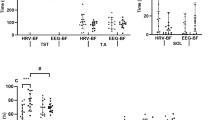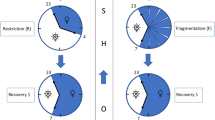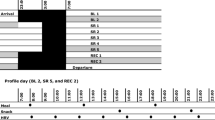Abstract
Background
Sleep deprivation (SD) is known to be associated with increased incidence of adverse cardiovascular events, but underlying pathophysiological mechanism has not been clearly demonstrated. Autonomic nervous system plays an important role in the regulation of cardiovascular function, and impairment in this system is associated with increased cardiovascular mortality. The aim of the current study was to investigate the effect of acute SD on autonomic regulation of cardiac function by determining heart rate recovery (HRR).
Methods
Twenty-one healthy security officers and nine nurses (mean age 33.25 ± 8.18) were evaluated. Treadmill exercise test was applied once after a night with regular sleep and once after a night shift in hospital. The HRR was calculated as the reduction in heart rate from peak exercise to the 30th second (HRR30), 1st minute (HRR1), 2nd minute (HRR2), 3rd minute (HRR3), and 5th minute (HRR5). The change in blood pressure (BP) measurements was also determined.
Results
Exercise capacity of individuals with SD was significantly lower (10.96 ± 1.01 vs. 11.71 ± 1.30 metabolic equivalent task (MET)s; p = 0.002), and peak systolic BP was significantly higher (173.8 ± 16.3 vs. 166.2 ± 9.9; p = 0.019). There was a signicant difference in HRR30 (12.74 ± 6.19 vs. 17.66 ± 5.46; p = 0.003) and HRR1 (31 ± 6.49 vs. 36.10 ± 7.78; p = 0.004). The ratio of these indices to peak HR was also significantly lower with SD (HRR%30 8.04 ± 4.26 vs. 10.19 ± 3.21; p = 0.025 and HRR%1: 18.66 ± 4.43 vs. 20.98 ± 4.72; p = 0.013). The difference in other indices of HRR was not significant.
Conclusion
Our findings suggest that SD blunts cardiovascular autonomic response, and consequences of this relation might be more pronounced in subjects who are exposed to sleeplessness regularly or in subjects with baseline cardiovascular disease.

Similar content being viewed by others
References
Cappuccio FP, Cooper D, D’Elia L, Strazzullo P, Miller MA (2011) Sleep duration predicts cardiovascular outcomes: a systematic review and meta-analysis of prospective studies. Eur Heart J 32(12):1484–1492. doi:10.1093/eurheartj/ehr007
Gallicchio L, Kalesan B (2009) Sleep duration and mortality: a systematic review and meta-analysis. J Sleep Res 18(2):148–158. doi:10.1111/j.1365-2869.2008.00732.x
Sunbul M, Kanar BG, Durmus E, Kivrak T, Sari I (2013) Acute sleep deprivation is associated with increased arterial stiffness in healthy young adults. Sleep Breathing 18(1):215–220. doi:10.1007/s11325-013-0873-9
Sari I, Davutoglu V, Ozbala B, Ozer O, Baltaci Y, Yavuz S, Aksoy M (2008) Acute sleep deprivation is associated with increased electrocardiographic P-wave dispersion in healthy young men and women. Pacing Clin Electrophysiol: PACE 31(4):438–442. doi:10.1111/j.1540-8159.2008.01013.x
Wolk R, Gami AS, Garcia-Touchard A, Somers VK (2005) Sleep and cardiovascular disease. Curr Probl Cardiol 30(12):625–662. doi:10.1016/j.cpcardiol.2005.07.002
Acar G, Akcakoyun M, Sari I, Bulut M, Alizade E, Ozkan B, Yazicioglu MV, Alici G, Avci A, Kargin R, Esen AM (2013) Acute sleep deprivation in healthy adults is associated with a reduction in left atrial early diastolic strain rate. Sleep Breathing 17(3):975–983. doi:10.1007/s11325-012-0786-z
Maeder M (2013) Reduced left atrial early strain rate following acute sleep deprivation: chance finding or chance to find out more on the conundrum of sleep and cardiovascular disease? Sleep Breathing 17(3):899–901. doi:10.1007/s11325-012-0787-y
Tobaldini E, Cogliati C, Fiorelli EM, Nunziata V, Wu MA, Prado M, Bevilacqua M, Trabattoni D, Porta A, Montano N (2013) One night on-call: sleep deprivation affects cardiac autonomic control and inflammation in physicians. Eur J Intern Med 24(7):664–670. doi:10.1016/j.ejim.2013.03.011
Vivekananthan DP, Blackstone EH, Pothier CE, Lauer MS (2003) Heart rate recovery after exercise is a predictor of mortality, independent of the angiographic severity of coronary disease. J Am Coll Cardiol 42(5):831–838
Cole CR, Blackstone EH, Pashkow FJ, Snader CE, Lauer MS (1999) Heart-rate recovery immediately after exercise as a predictor of mortality. N Engl J Med 341(18):1351–1357. doi:10.1056/nejm199910283411804
Pierpont GL, Stolpman DR, Gornick CC (2000) Heart rate recovery post-exercise as an index of parasympathetic activity. J Auton Nerv Syst 80(3):169–174
Louthrenoo W, Ruttanaumpawan P, Aramrattana A, Sukitawut W (1999) Cardiovascular autonomic nervous system dysfunction in patients with rheumatoid arthritis and systemic lupus erythematosus. QJM 92(2):97–102. doi:10.1093/qjmed/92.2.97
Chung MH, Kuo TB, Hsu N, Chu H, Chou KR, Yang CC (2009) Sleep and autonomic nervous system changes—enhanced cardiac sympathetic modulations during sleep in permanent night shift nurses. Scand J Work, Environ Health 35(3):180–187
Saxena AD, George CF (2005) Sleep and motor performance in on-call internal medicine residents. Sleep 28(11):1386–1391
Adams SL, Roxe DM, Weiss J, Zhang F, Rosenthal JE (1998) Ambulatory blood pressure and Holter monitoring of emergency physicians before, during, and after a night shift. Acad Emerg Med: Off J Soc Acad Emerg Med 5(9):871–877
Fletcher GF, Balady GJ, Amsterdam EA, Chaitman B, Eckel R, Fleg J, Froelicher VF, Leon AS, Pina IL, Rodney R, Simons-Morton DA, Williams MA, Bazzarre T (2001) Exercise standards for testing and training: a statement for healthcare professionals from the American Heart Association. Circulation 104(14):1694–1740
Cappuccio FP, D’Elia L, Strazzullo P, Miller MA (2010) Sleep duration and all-cause mortality: a systematic review and meta-analysis of prospective studies. Sleep 33(5):585–592
Alkadhi K, Zagaar M, Alhaider I, Salim S, Aleisa A (2013) Neurobiological consequences of sleep deprivation. Curr Neuropharmacol 11(3):231–249. doi:10.2174/1570159x11311030001
Frey DJ, Fleshner M, Wright KP Jr (2007) The effects of 40 h of total sleep deprivation on inflammatory markers in healthy young adults. Brain Behav Immun 21(8):1050–1057. doi:10.1016/j.bbi.2007.04.003
Noguti J, Andersen M, Cirelli C, Ribeiro D (2013) Oxidative stress, cancer, and sleep deprivation: is there a logical link in this association? Sleep Breathing 17(3):905–910. doi:10.1007/s11325-012-0797-9
Ayas NT, Hirsch AA, Laher I, Bradley TD, Malhotra A, Polotsky VY, Tasali E (2014) New frontiers in obstructive sleep apnoea. Clin Sci 127(4):209–216. doi:10.1042/cs20140070
Depner CM, Stothard ER, Wright KP Jr (2014) Metabolic consequences of sleep and circadian disorders. Curr Diabetes Rep 14(7):507. doi:10.1007/s11892-014-0507-z
Ozer O, Ozbala B, Sari I, Davutoglu V, Maden E, Baltaci Y, Yavuz S, Aksoy M (2008) Acute sleep deprivation is associated with increased QT dispersion in healthy young adults. Pacing Clin Electrophysiol: PACE 31(8):979–984. doi:10.1111/j.1540-8159.2008.01125.x
Mora S, Redberg RF, Cui Y, Whiteman MK, Flaws JA, Sharrett AR, Blumenthal RS (2003) Ability of exercise testing to predict cardiovascular and all-cause death in asymptomatic women: a 20-year follow-up of the lipid research clinics prevalence study. JAMA: J Am Med Assoc 290(12):1600–1607. doi:10.1001/jama.290.12.1600
Dufay-Bougon C, Belin A, Dahdouh ZS, Barthelemy S, Mabire JP, Sabatier R, Milliez P, Grollier G (2013) The prognostic value of the cardiopulmonary exercise test in patients with heart failure who have been treated with beta-blockers. Turk Kardiyoloji Dernegi Arsivi 41(2):105–112. doi:10.5543/tkda.2013.87404
Schwartz PJ, La Rovere MT, Vanoli E (1992) Autonomic nervous system and sudden cardiac death. Exp Basis Clin Obs Post-myocardial Infarction Risk Circ 85(1 Suppl):I77–I91
Imai K, Sato H, Hori M, Kusuoka H, Ozaki H, Yokoyama H, Takeda H, Inoue M, Kamada T (1994) Vagally mediated heart rate recovery after exercise is accelerated in athletes but blunted in patients with chronic heart failure. J Am Coll Cardiol 24(6):1529–1535
Malmberg B, Persson R, Flisberg P, Orbaek P (2011) Heart rate variability changes in physicians working on night call. Int Arch Occup Environ Health 84(3):293–301. doi:10.1007/s00420-010-0593-4
Carev M, Karanovic N, Bagatin J, Matulic NB, Pecotic R, Valic M, Marinovic-Terzic I, Karanovic S, Dogas Z (2011) Blood pressure dipping and salivary cortisol as markers of fatigue and sleep deprivation in staff anesthesiologists. Coll Antropologicum 35(Suppl 1):133–138
Azboy O, Kaygisiz Z (2009) Effects of sleep deprivation on cardiorespiratory functions of the runners and volleyball players during rest and exercise. Acta Physiol Hung 96(1):29–36. doi:10.1556/APhysiol.96.2009.1.3
Lusardi P, Zoppi A, Preti P, Pesce RM, Piazza E, Fogari R (1999) Effects of insufficient sleep on blood pressure in hypertensive patients: a 24-h study. Am J Hypertens 12(1 Pt 1):63–68
Ozeke O, Gungor M, Hizel SB, Aydin D, Erturk O, Celenk MK, Dincer H, Ilicin G, Ozgen F, Ozer C (2011) Influence of the severity of obstructive sleep apnea on nocturnal heart rate indices and its association with hypertension. Anadolu Kardiyoloji Dergisi 11(6):509–514. doi:10.5152/akd.2011.135
Takase B, Akima T, Satomura K, Ohsuzu F, Mastui T, Ishihara M, Kurita A (2004) Effects of chronic sleep deprivation on autonomic activity by examining heart rate variability, plasma catecholamine, and intracellular magnesium levels. Biomed Pharmacother 58(Suppl 1):S35–S39
Charloux A, Gronfier C, Chapotot F, Ehrhart J, Piquard F, Brandenberger G (2001) Sleep deprivation blunts the night time increase in aldosterone release in humans. J Sleep Res 10(1):27–33
Nishime EO, Cole CR, Blackstone EH, Pashkow FJ, Lauer MS (2000) Heart rate recovery and treadmill exercise score as predictors of mortality in patients referred for exercise ECG. JAMA: J Am Med Assoc 284(11):1392–1398
Watanabe J, Thamilarasan M, Blackstone EH, Thomas JD, Lauer MS (2001) Heart rate recovery immediately after treadmill exercise and left ventricular systolic dysfunction as predictors of mortality: the case of stress echocardiography. Circulation 104(16):1911–1916
Shetler K, Marcus R, Froelicher VF, Vora S, Kalisetti D, Prakash M, Do D, Myers J (2001) Heart rate recovery: validation and methodologic issues. J Am Coll Cardiol 38(7):1980–1987
Morshedi-Meibodi A, Larson MG, Levy D, O’Donnell CJ, Vasan RS (2002) Heart rate recovery after treadmill exercise testing and risk of cardiovascular disease events (The Framingham Heart Study). Am J Cardiol 90(8):848–852
Dogru MT, Aydin G, Tosun A, Keles I, Guneri M, Arslan A, Ebinc H, Orkun S (2009) Correlations between autonomic dysfunction and circadian changes and arrhythmia prevalence in women with fibromyalgia syndrome. Anadolu Kardiyoloji Dergisi 9(2):110–117
Yurdakul S, Erdemir VA, Yildirimturk O, Gurel MS, Aytekin S (2012) Evaluation of endothelial functions in patients with Behcet’s disease without overt vascular involvement. Turk Kardiyoloji Dernegi Arsivi 40(6):518–522. doi:10.5543/tkda.2012.43078
Schachinger V, Britten MB, Zeiher AM (2000) Prognostic impact of coronary vasodilator dysfunction on adverse long-term outcome of coronary heart disease. Circulation 101(16):1899–1906
Hijmering ML, Stroes ES, Olijhoek J, Hutten BA, Blankestijn PJ, Rabelink TJ (2002) Sympathetic activation markedly reduces endothelium-dependent, flow-mediated vasodilation. J Am Coll Cardiol 39(4):683–688
Huang PH, Leu HB, Chen JW, Cheng CM, Huang CY, Tuan TC, Ding PY, Lin SJ (2004) Usefulness of attenuated heart rate recovery immediately after exercise to predict endothelial dysfunction in patients with suspected coronary artery disease. Am J Cardiol 93(1):10–13
Conflict of interest
The authors certify that there is no conflict of interest with any financial organization regarding the material discussed in this article.
Funding
No grant received for this study.
Author information
Authors and Affiliations
Corresponding author
Rights and permissions
About this article
Cite this article
Cincin, A., Sari, I., Oğuz, M. et al. Effect of acute sleep deprivation on heart rate recovery in healthy young adults. Sleep Breath 19, 631–636 (2015). https://doi.org/10.1007/s11325-014-1066-x
Received:
Revised:
Accepted:
Published:
Issue Date:
DOI: https://doi.org/10.1007/s11325-014-1066-x




